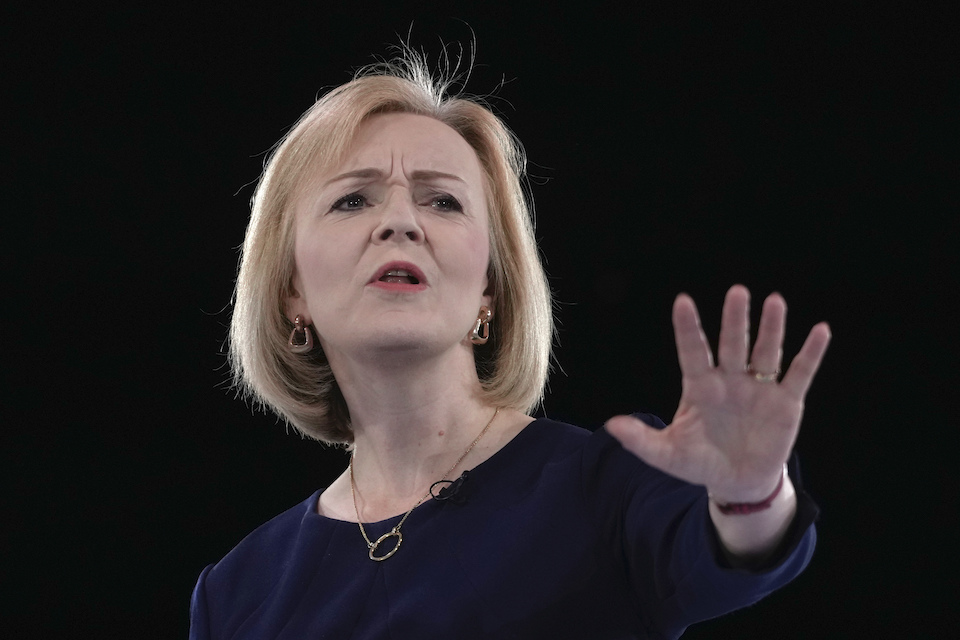
The official announcement is expected on the evening of Monday, September 5th. A days-long internal party vote that preceded the hot-blooded election of Boris Johnson’s successor as leader of the ruling party in the United Kingdom ended only last Friday. However, there seems to be no anxiety, or rather, there is … but not for the name that will be announced on Monday, but for what will follow under the leadership of the named name.
Liz Truss, 47, the current foreign secretary of the United Kingdom, will be – barring a shocking prospect – the next prime minister, succeeding Boris Johnson: the first woman to hold the post in the UK since Theresa May and “iron” Margaret Thatcher.

Who is Liz Truss? A politician with a long career and… chameleon tendencies who started on the centre-left political spectrum (as the Liberal Democrat youth chair at Oxford University and an “enemy” of the monarchy) before moving to the right, and from the pro-European camp Remain (until the 2016 referendum) until transition to euroskeptics on the opposite bank of the Exit (after the referendum).
Politician who hates to lose
In the eyes of her detractors, Truss is overly ambitious, overly chameleon-like, opinionated, opportunistic, and sometimes brash, and even her own people (like her brother) talk about a woman who hates to lose… even in Monopoly. .
On the other hand, Truss remains “unknown” in the eyes of most British voters.
Unknown to many
“She has served six ministerial posts under three different prime ministers… Yet many Britons don’t know her…” The Washington Post writes, outlining a reality that is expected to change from September 5 onwards. , while she is now prime minister as the “new Thatcher”.

A 47-year-old woman is about to take over the reins of the United Kingdom at an extremely difficult time when everyone is against her.
Open fronts with everyone
Moscow is waiting for him in the corner, like the “eternal enemy” of the British, with a Ukrainian at the head. Truss’s episodic meeting as foreign secretary with his Russian counterpart Sergey Lavrov in Moscow last February, on the eve of the Russian invasion, comes to mind, against the backdrop of which the Russian side then accused the British Foreign Office of not even knowing it, if some regions (Rostov, Voronezh) are located in Russia or Ukraine.
However, the West, on the other hand, does not seem to welcome Thras’ premiership with open arms. On the other hand.
American sources are already sending warning messages through leaks and publications (Financial Times, New York Times) urging the 47-year-old woman to change her style and tactics.
In this context, it is shown that Truss “has precedents” (not only with Lavrov, but also with Anthony Blinken). The meeting she had with the US Secretary of State in September 2021 in New York appears to have made a lasting impression on Americans, who are now wondering “whether the Brit will bring her pomposity and pompous style to Downing Street.”
But also in Europe, despite what has preceded in recent years (pandemic, war in Ukraine), the clouds of Brexit not only remain, but also thicken in the shadow of publications (The Guardian, FT) who want the new British Prime Minister activated. article 16 of the Protocol between Ireland and Northern Ireland, thus trying to circumvent what was agreed with the Europeans.
“If the French and the British cannot tell if they are friends or enemies, then we will have problems,” French President Emmanuel Macron commented, looking at the doubts that Trouss expressed at some point in the distant past, but only a few weeks ago about whether France is ultimately “friend” or “enemy” of Britain.
Warnings
“Based on Thras’ tenure at the Foreign Office, diplomats and analysts are warning that (London’s) relations with the United States, and even more so with Europe, could become even more difficult” in the near future, writes Mark Ladler in the New York Times. once.
But at the same time, the situation inside the British borders is also explosive, and at many levels: party (for the Tories themselves), political (against the opposition), socio-economic (inflation, energy crisis) and national. (independence trends and scenarios for a new referendum in Scotland).
It is recalled that the ruling Conservative Party came out deeply divided in the voting on it. vote of no confidence which deputies of the ruling majority testified against him Boris Johnson last June.
Now, exactly three months later, Truss is being warned by many not to fill government and ministries with Johnson supporters.
“High Tories warn Liz Truss that she will lead the deeply divided party to inevitable defeat in the next election if she does not make an effort to include high-profile figures from across the party, including critics of Boris Johnson, into her cabinet,” The Guardian writes.
And the British opposition, however, is waiting in the corner of Truss, as are the British voters, because the tens of thousands of Tory members who voted for the new prime minister in the internal party process may be more than hundreds of Conservative deputies, but they should by no means be considered representatives British society, especially in times of multiple crises like this one, when prices are skyrocketing and British daily life is giving rise to tales of energy madness.
Scripts for Johnson as well
And since seemingly “madness” is never enough, scenarios are also circulating that claim that Johnson’s return to the nation’s central political scene and, why not, even to the premiership is possible.
“Johnson is committed to supporting anyone who takes the reins of power in their own hands. However […] if things go wrong for his successor, he might start thinking about returning,” writes CNN’s Luke McGee, citing sources close to friends and colleagues of the outgoing prime minister.
Tori Psychodrama
In any case, the fact that the UK has had four Conservative prime ministers in just six years (David Cameron, Theresa May, Boris Johnson, Liz Truss) does not indicate stability. On the contrary, it is considered a sign of “psychodrama” (the editors of The Washington Post refer to “Tory psychodrama”), which clearly stems, at least to some extent, from Brexit.
“Hot” coming winter
However, the worst may not be behind, but ahead. Analyzing the challenges the UK faces as winter approaches, Gzero editors paint a dystopian future of recession, inflationary pressures, business failures and energy shortages, highlighting how much more vulnerable the UK is to energy compared to other European countries (due to limited storage capacity). ). energy balance), despite being much less dependent on Russian natural gas.
What will Liz Truss do as prime minister in such difficult circumstances? However, she said she would cut taxes…
Source: Kathimerini
Anna White is a journalist at 247 News Reel, where she writes on world news and current events. She is known for her insightful analysis and compelling storytelling. Anna’s articles have been widely read and shared, earning her a reputation as a talented and respected journalist. She delivers in-depth and accurate understanding of the world’s most pressing issues.